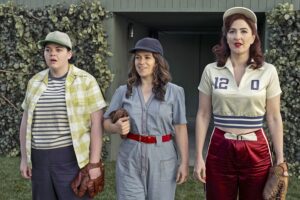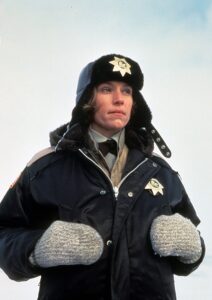We have compiled some of our favorite films and TV series, new and old, comfort shows or tension-inducing thrillers, that feature powerful women. Politicians, police chiefs, orchestra conductors, fight clubs, or all-women baseball teams — the women in these films wield power in different ways, good and bad.
The Diplomat, 2023

Season two of Netflix’s The Diplomat dropped on Oct. 31. Here’s a recap of season one: it opens with a terrorist attack on a British aircraft carrier in the Persian Gulf. Dozens of Royal Navy officers are dead; Iran is suspected. Foreign service officer Kate Wyler (Keri Russell), packing for an assignment in Afghanistan, is called to the White House where the president informs her she’s being rerouted to serve as America’s new ambassador to Britain. The big gig is actually an audition; Wyler is being considered for vice president, depending on how she handles America’s “special relationship” with the Brits.
Trouble is, Wyler has no patience for pageantry, stylists, or the suggestion that she do an interview with British Vogue: “The only tea-length garment I have is a burka,” she tells aides. “I have a black suit. And another black suit. And I’m not getting dressed by someone named Pippa so a women’s magazine can ask ‘who’ I’m wearing and what advice I have for little girls.”
Traveling with her to the Downton Abbey-esque ambassador’s residence is estranged husband Hal Wyler (Rufus Sewell), a seasoned diplomat who’s been sidelined for calling the secretary of state a war criminal. Kate wants him around long enough to help her acclimate to the politics of Downing Street; then she’s kicking him out. Meanwhile, it looks like Russia may have bombed the carrier. But why?
No wonder I love this series — its creator is the fiercely talented Debora Cahn, who began as a writer and producer on NBC’s The West Wing, then moved on to ABC’s Grey’s Anatomy and Showtime’s Homeland. Her female characters are tough as nails, never softened with glossy veneers. In The Diplomat, Kate Wyler ignores her stringy, unkempt hair and puts her armpits in her estranged husband’s face, commanding him to do a smell test. —Katy Abel
A League of Their Own, 2022

The 1992 movie A League of Their Own, directed by Penny Marshall, revealed the buried sports history of women’s professional baseball: the 1943-1954 All-American Girls Professional Baseball League, not honored in the Baseball Hall of Fame until 1988, kept the sport alive while men fought in World War II. But key parts of that story were missing, and I found a fuller picture in the 2022 series.
The eight-episode show co-created by and starring Abbi Jacobsen (Broad City) focuses on the Rockford (Ill.) Peaches team, like the original movie, but its characters face a broader range of challenges than the movie dared to cover.
Team members and Black pitcher Max (Chanté Adams), who’s banned from the league, push back against limited roles, bristle at being glammed up as men’s eye-candy, and determinedly celebrate athletic talents skeptics say are unfeminine. The series also delves into same-sex romances, racism, gender identity, and secret gatherings of gay women and men.
I’m a Tom Hanks fan, but how refreshing to see his League-movie coach role (Nick Offerman here) relegated to incidental. It’s the series’ women who, satisfyingly, are responsible for their own successes in baseball and life, whether individually lifting each other up or working as a team. You’ll be cheering at the final episode. —Kathi Scrizzi Driscoll
Tár, 2022

“Power tends to corrupt, and absolute power corrupts absolutely,” wrote the British historian Lord Acton in 1887. “Great men are almost always bad men.” It is a measure of how far things have come in terms of gender equality and representation since then that the same can be said of certain great women.
Nowhere has this been portrayed better in recent memory than in director Todd Field’s 2022 masterpiece Tár. Part character study, part supernatural-tinged mystery, and wholly a career-best star vehicle for Cate Blanchett (who was robbed of her rightful Best Actress trophy at the Academy Awards), Tár also illustrates another well-known aphorism, this one by the contemporary American artist Jenny Holzer: “Abuse of power comes as no surprise.”
As Lydia Tár — superstar orchestra conductor and EGOT winner — Blanchett imbues her character with enough charisma and moral ambiguity that we are irresistibly fascinated by her despite the problematic relationships she might (or might not) have had with her younger female subordinates. Is Lydia Tár really a predatory monster or the unfair victim of cancel culture who doesn’t deserve her eventual comeuppance? For me, those questions aren’t as important as what the film has to say about the many ways — both subtle and overt — that power changes the person who wields it. And if nothing else, after watching it you’ll never hear Mahler’s Fifth Symphony in the same way again. —John D’Addario
Bottoms, 2023

The 2023 film Bottoms, directed and written by Emma Seligman and co-written by Rachel Sennott, is drip-tears-of-laughter-into-your-popcorn-bucket funny.
Rom-coms are almost never as “com” as they claim to be. But Bottoms strikes the perfect balance. Highschoolers PJ (Rachel Sennott) and Josie (Ayo Edebiri) are best friends. They’re also lesbians, virgins, and severely unpopular. Until they hatch their master plan — starting an all-female fight club (disguised as a club for female solidarity) in order to get close to and ultimately, hopefully, hook up with two hot cheerleaders. Chaos, disaster, and hilarity ensue.
Walking out of my college-town movie theater, I remember feeling electric joy. Rare is the film that features a band of young women making and resolving stupid mistakes, all without the major motivation or interference of a male love interest. That coming-of-age style movie has historically been reserved for young men: think Stand By Me (1986) and Dead Poets Society (1989). You know the type.
Not only does Bottoms occupy a rare niche — it also doesn’t take itself too seriously. The girls assume their power subtly (developing self-confidence) and obviously (triumphing in absurdly gory battles). Everything occurs naturally in a ridiculous sort of way. It instantly became a classic in my mind, but a new kind of classic. The kind that I want more of. For now, I’ll just rewatch Bottoms. —Eve Samaha
Fargo, 1996

In Fargo, directed by Joel Coen, violent, cowardly men do violent, cowardly things. For the first 30 minutes, the only woman is Jean Lundegaard — she’s kidnapped by criminals as part of her husband’s plot to extort her wealthy father. Then, as this plan goes predictably wrong, we meet the movie’s heroine: Police Chief Marge Gunderson (Frances McDormand).
Marge is the archetype of an empowered woman. As she hunts down Jean’s kidnappers, the rightness of her authority is never called into question. Her subordinates respect her, her husband treasures her, and the criminals she’s chasing fear her, all while she’s seven months pregnant.
What makes Marge special, though, is not that she’s some tough-as-nails cop — though she gets her bad-ass moments — but rather that she’s profoundly empathetic. She is supportive of her husband’s dream of being a painter. She’s kind to her fellow officers. She cares for the people she’s helping.
At the end of the movie, Marge drives home with a murderer in her back seat, her face stony and disturbed. She tells him that she can’t understand why he would do something so heinous “for a little bit of money.” She gazes out at the dreary midwinter Minnesota landscape. “And it’s a beautiful day,” she says.
In that moment, Marge’s ethos is captured: an incorruptible person who looks upon a gray, cold place filled with violent men and calls it beautiful. No one but her could see the good in such a place, and no one but her could better wield the power to protect it. —William von Herff



